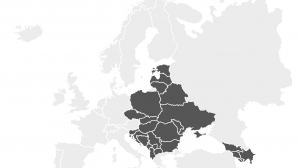When my mother died after a long illness last year I tried to set up a UK bank account in order to make dealing with a number of administrative issues as easy (and as cheap) as possible. After visiting just about every high street bank in the UK it became clear very quickly that opening an account was not going to be an option. Having lived outside the UK for more than 20 years I had neither a credit history nor – more crucially – did I have proof of a UK address.
So I looked for alternatives, and quickly found TransferWise. Its app allowed me to open an account in minutes, using my mobile phone. Technology – much of it powered by Estonian engineers – is at the heart of the operation, driving the necessary background checks. I received a debit card two days later.
“I was in a similar position myself,” says Alastair Thompson, head of business development and partnerships at TransferWise. “It’s the reason I joined TransferWise. I was living in the US with a job, I had a visa, but could not get a bank account. I had to use all sorts of expensive options.”
TransferWise now serves more than five million customers just like Thompson and myself, processing four billion UK pounds each month, via its money transfer service and increasingly popular borderless accounts, available to both individuals and businesses.
“Banks are very good at a number of things, but something they have never done well is international transfers,” says Thompson.
Using 1,600 currency routes and 49 currencies, TransferWise offers customers the chance to exchange and move money using the mid-market rate. Almost 20 per cent of its international transfers are instant, delivered in less than 20 seconds.
Last April, TransferWise became the first fintech group to gain direct access to the Bank of England’s interbank payment system, as regulators and the government step up their efforts to encourage competition in the UK’s financial sector.
A new investment round, completed at the end of May, values TransferWise at 3.5 billion US dollars, making the company the most valuable of all Europe’s fintech start-ups.
TransferWise has more than 1,600 employees (and is set to hire a further 750 in the next year), of whom half are based in the Estonian capital Tallinn: the company’s two founders, Taavet Hinrikus and Kristo Kaarmann, are both Estonians. The entire company decamps twice a year to the Baltic state for a series of talks and experience sharing, but while clearly proud of its Estonian roots and the input of the Estonian talent which is still a key part of the company’s success, TransferWise is keen to be viewed as a global company.
“We are a global product trying to knock down borders,” says Alastair Thompson.
While the borderless account – of which there are now more than half a million – has been a huge success, allowing people to transparently send money from bank account to bank account is still TransferWise’s core business.
“TransferWise allows you receive money as a local, in the currency you want. Our business is all about what the customer needs. The more problems we are solving for customers the more people will get the mid-market rate,” Thompson tells Emerging Europe.
Key to TransferWise’s success is trust. As much as 70 per cent of business comes via word of mouth.
“When you make your payment we estimate when it will arrive. We send you an email when the money has gone, and send the recipient an email to let them know the money is coming. The fee is upfront. The amount we say will arrive is always the amount that actually arrives. That all builds trust,” says Thompson.
TransferWise recently hooked up with challenger bank Monzo to incorporate its infrastructure and mid-market exchange rates into Monzo’s app.
“That is the future. We do not require customers to hold an account with us to make the most of what we offer. Partnerships are the future and we see that happening with legacy banks too. We have a dedicated team which is exploring ways that TransferWise can help the banks,” adds Thompson.
“What we have created is an incredible thing. We had to create a network, come up with the technology in order to get the money through the system and provide customer support. Our mission is to make money transfers transparent. Banks have always hidden their fees in the exchange rate. To this day they still advertise zero per cent commission.”





Add Comment